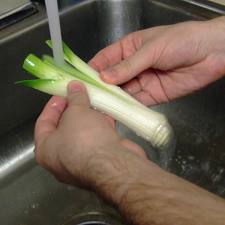Food Safety Talk, a bi-weekly podcast for food safety nerds, by food safety nerds. The podcast is hosted by Ben Chapman and barfblog contributor Don Schaffner, Extension Specialist in Food Science and Professor at Rutgers University. Every two weeks or so, Ben and Don get together virtually and talk for about an hour. They talk about what’s on their minds or in the news regarding food safety, and popular culture. They strive to be relevant, funny and informative — sometimes they succeed. You can download the audio recordings right from the website, or subscribe using iTunes.
After a brief discussion about Quadrophenia, the guys thankfully decide to not sing this episode.
Ben mentions that the last video store in the Raleigh area is closing. This led to some discussion about the job security of academic careers where Don stated, ‘prediction is very difficult especially about the future.’
Spurred by Ben’s short visit to Baltimore, the guys then discuss how awesome The Wire is. Don mentions a perspective by David Simon, the Wire’s creator, on the real life situation in Baltimore. Ben was recently in Baltimore for the Food Safety Summit. A nod goes out to Brian Saunders for doing a good job of boots on the ground coverage of what’s going on in Baltimore during the Food Safety Summit.
Don recommends Acorn TV for anyone interested in British TV. This subscription service has British programming not typically shown on US TV. At the Acorn website Ben spotted Time Team an archeology reality series that he thinks his kids would love.
This week Ben talks about media interviews and a focus on multiple food safety stories all hitting at the same time. He talked a cutting boards post on barfblog that garnered some attention. He also fielded inquires regarding the Blue Bell Listeria outbreak . Ben noted that Blue Bell announced they are recalling all the ice cream.
A tragic botulism outbreak linked to a church potluck in Ohio was also a topic in multiple media outlets. The potluck outbreak was linked to home-canned potatoes but the coverage prompted a side conversation about bot and foil-wrapped baked potatoes.
Looking ahead to future food outbreaks Ben mentions that a bill was introduced in North Carolina to legalize raw milk. This bill would allow consumers to legally acquire raw milk via a cow share mechanism. In this article Ben is quoted challenging an inappropriate comparison of raw milk outbreak data by the bill’s sponsor.
In After Dark Don shames Ben for not listening to Roderick on the Line. Again.
– 30 –




 Oven-roasted salmon fillets (the farm-raised kind – more sustainable) with olive oil, lime juice, garlic and fresh thyme, corn-on-the-cob (Sorenne’s favorite, but getting starchy as the cold weather moves in), baked Russett potatoes and asparagus spears, the frozen kind, which were surprisingly good.
Oven-roasted salmon fillets (the farm-raised kind – more sustainable) with olive oil, lime juice, garlic and fresh thyme, corn-on-the-cob (Sorenne’s favorite, but getting starchy as the cold weather moves in), baked Russett potatoes and asparagus spears, the frozen kind, which were surprisingly good.
 Sounds pretty gross, but—if necessary—most of the
Sounds pretty gross, but—if necessary—most of the 